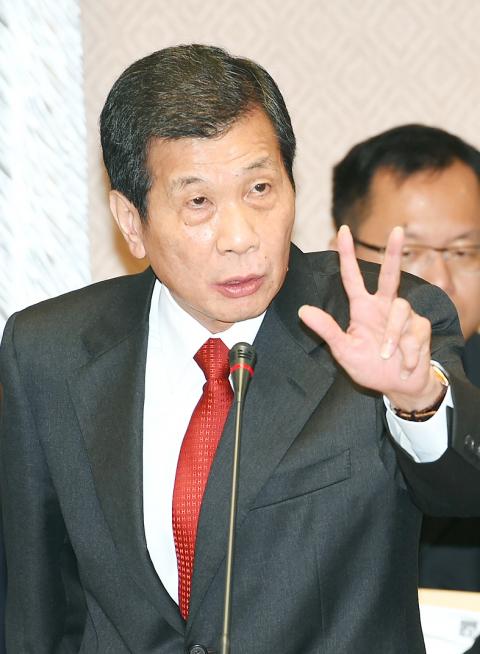Illegal mining of sea sand has been a serious problem off Kinmen, with Chinese dredgers regularly entering the nation’s waters and taking almost 20,000 tonnes of sand over the past 10 years, Democratic Progressive Party (DPP) legislators said yesterday in Taipei, urging the government to block the activity, which they said could cause irreversible damage to Taiwan’s coastline.
They made their remarks during a legislative Internal Administration Committee meeting in which the Mainland Affairs Council (MAC) and other agencies were asked to report on the Cross-Strait Joint Crime-Fighting and Judicial Mutual Assistance Agreement signed in 2009.
Chinese dredgers have been active in Kinmen’s waters without facing sustained and compelling opposition from Taiwanese authorities, DPP Legislator Tuan Yi-kang (段宜康) said, citing a report by the Chinese-language CommonWealth Magazine published in July last year.

Photo: Chang Chia-ming, Taipei Times
Taiwanese authorities have addressed 45 cases of sea sand dredging — which is prohibited by both Taiwan and China in certain waters, including those around Kinmen — by Chinese boats in Kinmen’s waters since 2005, Coast Guard Administration Minister Wang Chung-yi (王崇儀) said at the meeting.
“[An estimated] 12,703 cubic meters of sea sand had been illegally mined, which is close to 20,000 tonnes,” Wang said. “There was only one case last year. And in 2013, while we had four, the Chinese authorities had cracked down 391 attempts of overstepped sea mining.”
Wang said Chinese dredging boats were cunning enough to stay along the boundary line and would retreat to Chinese waters whenever Taiwanese Coast Guard vessels approached.
“They had then been detained by the Chinese marine surveillance fleets, which had waited there to capture the boats,” Wang said.
“Only China’s marine surveillance fleets are clever enough to wait for them near the maritime boundary and our coast guard is not?” DPP Legislator Chen Chi-mai (陳其邁) asked.
Wang acknowledged that there is “room for improvement” on law enforcement.
Tuan asked whether people on Taiwan’s side of the Strait “collude with Chinese sea sand mining boats,” which could explain why ending the practice has been so difficult.
“I am not sure about the bureaucrats or officials, but it is possible that private companies across the Strait have conspired to cash in on the illegal dredging,” Wang said.
Tuan also took the government to task for calling on China’s Fujian provincial government to “suspend its clampdown on [sand mining plants] along Jiulong River in Fujian Province because many Taiwanese businesses relied on them.”
Ministry of Economic Affairs Bureau of Mines Director Chu Chao-ming (朱昭明), whose agency sent the request, said 80 percent of Taiwan’s sand imports come from that location.
“It is truly bizarre for a government to request [illegal activities in another country],” Tuan said, adding that the request would in turn hurt the legitimacy of Taiwan’s prohibition of sand mining at sea by Chinese boats.
When again questioned by Chen, Chu said that the sand handled by the plants was “river sand,” and the Chinese government was “adjusting [the operations] along the Jiulong River.”
MAC Minister Andrew Hsia (夏立言) said that the council would voice its concerns on this issue to its Chinese counterpart and that “the cross-strait relationship would be damaged if they choose to overlook the problem.”
According to the CommonWealth report, citing a marine environment and engineering professor, every 100,000 cubic meters (145,000 tonnes) mined by Chinese dredging boats could cause land subsidence of 1m in the area within 1km from Kinmen’s northern shore and a coastline retreat of 100m.

The Taipei Mass Rapid Transit (MRT) Wanda-Zhonghe Line is 81.7 percent complete, with public opening targeted for the end of 2027, New Taipei City Mayor Hou You-yi (侯友宜) said today. Surrounding roads are to be open to the public by the end of next year, Hou said during an inspection of construction progress. The 9.5km line, featuring nine underground stations and one depot, is expected to connect Chiang Kai-shek Memorial Hall Station to Chukuang Station in New Taipei City’s Jhonghe District (中和). All 18 tunnels for the line are complete, while the main structures of the stations and depot are mostly finished, he

The first global hotel Keys Selection by the Michelin Guide includes four hotels in Taiwan, Michelin announced yesterday. All four received the “Michelin One Key,” indicating guests are to experience a “very special stay” at any of the locations as the establishments are “a true gem with personality. Service always goes the extra mile, and the hotel provides much more than others in its price range.” Of the four hotels, three are located in Taipei and one in Taichung. In Taipei, the One Key accolades were awarded to the Capella Taipei, Kimpton Da An Taipei and Mandarin Oriental Taipei. Capella Taipei was described by

Taipei is to implement widespread road closures around Taipei 101 on Friday to make way for large crowds during the Double Ten National Day celebration, the Taipei Department of Transportation said. A four-minute fireworks display is to be launched from the skyscraper, along with a performance by 500 drones flying in formation above the nearby Nanshan A21 site, starting at 10pm. Vehicle restrictions would occur in phases, they said. From 5pm to 9pm, inner lanes of Songshou Road between Taipei City Hall and Taipei 101 are to be closed, with only the outer lanes remaining open. Between 9pm and 9:40pm, the section is

The Taipei Economic and Cultural Office in Vancouver, Canada, on Saturday hosted a reception to celebrate Double Ten National Day. Conservative Canadian lawmaker Marc Dalton called Taiwan a “beacon of courage and resilience in the face of rising authoritarianism,” according to a post on the Taiwan in Vancouver Facebook page. Also in attendance were fellow conservative caucus members Tako Van Popta and Chak Au, who said that Taiwan plays an “indispensable role” in ensuring global peace, prosperity and stability due to its strategic position in the Indo-Pacific region, it said. Canadian lawmaker Michael Cooper also recorded a message wishing Taiwan a